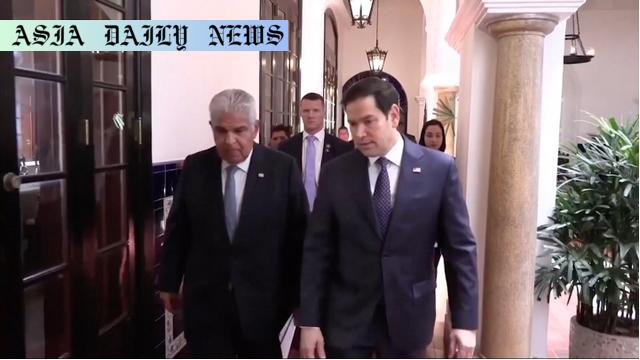Panama Canal: US Secretary of State Marco Rubio meets Panama’s President, expressing concerns over Chinese influence in the strategic waterway.

US Secretary of State Marco Rubio Visits Panama
US Secretary of State Marco Rubio has embarked on a high-stakes diplomatic visit to Panama, marking his first overseas trip in the role. The visit comes amid mounting geopolitical tensions surrounding the Panama Canal, a critical shipping route linking the Atlantic and Pacific Oceans. The United States, under the administration of President Donald Trump, has expressed concerns over China’s growing influence in the region. Rubio’s meeting with Panamanian President Jose Raul Mulino in Panama City on Sunday underscores the strategic importance of the canal to US interests.
Concerns Over Chinese Influence
A central issue during Rubio’s visit was the perceived threat posed by the Chinese Communist Party’s increasing footprint in the canal operations. The US State Department has characterized this influence as a potential security risk, with Rubio emphasizing President Trump’s unwavering determination to counter such developments. The Panama Canal, while operated by the Panamanian government, has seen significant involvement from Chinese firms in recent years, heightening concerns in Washington about China’s expanding global influence.
Calls for Reasserting US Control
President Trump has floated the idea of reclaiming control of the Panama Canal if the current dynamics do not align with US interests. This stance stems partly from Trump’s dissatisfaction with the fees imposed on American vessels using the waterway, which he claims are excessively high. The prospect of the US attempting to reassert control has drawn sharp reactions from the Panamanian government, which views such statements as a violation of national sovereignty. The canal was originally constructed by the United States but was handed over to Panama in 1999 as part of a historic agreement.
International Reactions
The Panamanian government has strongly opposed Trump’s comments, reaffirming its sovereignty over the canal. Panama’s President Mulino has stood firm against any suggestions of US intervention. Meanwhile, the United Nations has expressed concerns about the escalating rhetoric, emphasizing the importance of respecting international agreements and maintaining stability in one of the world’s most vital maritime routes.
The Bigger Picture: Geopolitical Rivalry
The growing tension surrounding the Panama Canal reflects broader geopolitical rivalries between the United States and China. Washington views Beijing’s involvement in infrastructure projects around the world, including those linked to critical resources and trade routes, as a strategic challenge. For Panama, the canal remains the cornerstone of its economy and international standing, making any external interference deeply contentious.
Potential Outcomes
As Rubio’s visit concludes, the future of US-Panama relations hangs in a delicate balance. While the US continues to push for measures to curb Chinese influence, Panama remains steadfast in its commitment to managing its affairs independently. The situation underscores the complexities of modern geopolitics, where economic, security, and political considerations converge around key global assets.
The coming months will likely see intensified diplomacy and negotiations as all parties seek to navigate this high-stakes issue. The Panama Canal’s status as a global shipping hub ensures it will remain at the center of geopolitical contention, with the potential to significantly impact international relations.
Commentary
The Strategic Importance of the Panama Canal
The Panama Canal has long been a cornerstone of global trade and geopolitics. Stretching over 50 miles and facilitating the passage of nearly 14,000 vessels annually, its strategic value cannot be overstated. As the United States raises concerns about China’s increasing involvement, one can’t help but view this development through the lens of 21st-century power struggles. For Washington, the canal represents not merely a vital trade route but also a historical legacy and a symbol of influence in the Western Hemisphere.
The US-China Rivalry
The tensions surrounding the Panama Canal highlight the growing mistrust between the United States and China. Beijing’s investments in global infrastructure, often under its Belt and Road Initiative, have been met with skepticism in many capitals, particularly Washington. The Panama Canal, given its strategic location and economic significance, is a potent stage for this rivalry. The US’s concerns, while partially economic, seem to be rooted more deeply in fears of a shifting global balance of power.
Implications for Panama
For Panama, this situation poses a unique challenge. On one hand, the country benefits from significant revenues generated by the canal, which it manages independently. On the other hand, its status as a small nation means that it must carefully navigate the demands and expectations of global powers. The firm stance taken by Panama’s government in response to Trump’s comments reflects a deep-seated commitment to national sovereignty. However, maintaining this position in the face of external pressures will be a test of diplomacy and resolve.
Looking Ahead
Ultimately, the unfolding developments surrounding the Panama Canal serve as a microcosm of larger global dynamics. They underscore the importance of dialogue and diplomacy in addressing conflicts of interest in a rapidly changing world. For all parties concerned, finding a solution that respects Panama’s sovereignty while addressing legitimate security concerns will be crucial moving forward. The canal’s role as a critical hub for international trade ensures that its future will remain a focal point of global attention in the years to come.


